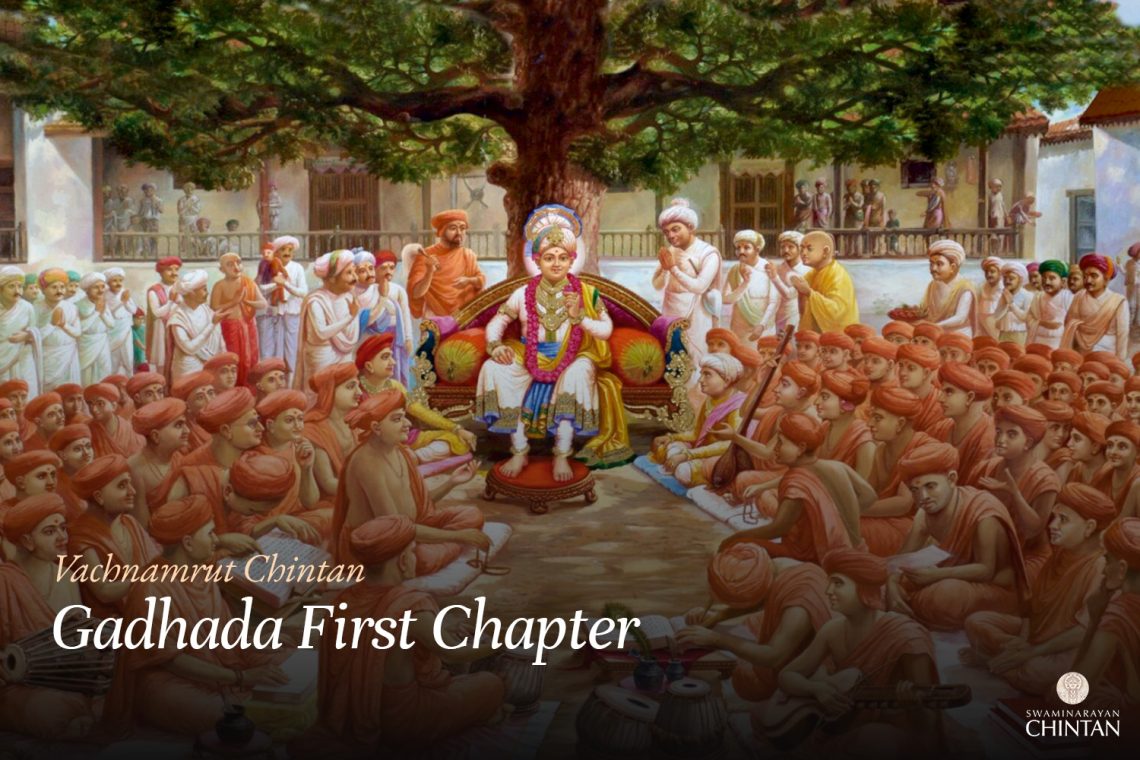Central Insights:
- Methods to maintain unwavering patience.
Key Points:
- Steadfastness in Ātmanishṭhā (firmness in self-realization) allows one to overcome worldly afflictions.
- To cross the obstacle of death, unwavering refuge in God is essential.
- For overcoming the tribulations and temptations before and after death, the support of firm upasana (worship) of God is the best method.
Explanation
In this Vachanamrut, Muktanand Swami first asked, “What is the method for maintaining patience when faced with kām (lust), krodh (anger), lobh (greed), and bhay (fear)?” In response, Maharaj said, “When ātmanishṭhā (self-realization) becomes extremely firm, patience will not waver.” Then, Brahmanand Swami inquired, “How helpful is ātmanishṭhā at the time of death?” Maharaj responded, “At the time of death, ātmanishṭhā does not help. At that moment, refuge in and upāsanā of God are required.” Muktanand Swami further asked, “Do siddhis (supernatural powers) come to those with firm conviction or to those with weak conviction?” Maharaj explained, “Siddhis come to those with firm conviction, and God tests these devotees by granting them siddhis. If they are not tempted by them, God becomes pleased with them. Therefore, devotees of God should not fear tests.”
Tests are of two types: one comes naturally, often as obstacles or suffering. The other type is a test knowingly conducted by a revered person. Tests also came to King Harishchandra, King Shibi, Rantidev, Dadhichi, and others. Similarly, Prahlad, Bali, Sita, Mirabai, and others faced tests. However, there is a difference between the tests. Harishchandra and others endured for the sake of virtues, while Prahlad and others endured to keep their devotion to God unbroken. Specifically, tests were taken of King Bali, Sita, Dada Khachar, Mulji Brahmachari, and Mulji Krishnaji (from village Manekuva) individually by God.
To maintain the path of virtues, the foundation is ātmanishṭhā. With a strong foundation of ātmanishṭhā, one can endure infinite suffering. For Prahlad and others, the foundation was their devotion to God. They endured the trials based on the devotion in their hearts. Specifically, the tests of King Bali, Dada Khachar, and others were based on their individual devotion to God, which can also be called upāsanā.
Maharaj said, “With the foundation of ātmanishṭhā, one can overcome hunger, thirst, happiness, sorrow, joy, and grief, but the time of death is severe. At that time, refuge in God is essential. One who has refuge in God overcomes the time of death. Even after death, the devotee faces obstacles, which are the temptations of siddhis (Eight Supernatural powers). To overcome these, the devotee must have a strong inclination or support for serving God. If the upāsanā is firm, one is not tempted by anything. This Vachanamrut hints at the factors that can lead one to change their path after following the path of God.”
One factor is extreme suffering or severe inconvenience, which we call times of calamity or harsh circumstances.
Another factor is if someone opposes us, meaning someone falls behind us or tests the devotees of God, some with little patience may change their path.
Additionally, a third factor that causes one to change their path is intense temptation. Intense temptations such as beauty, taste, respect, wealth, etc., can also lead one away from the path of God. Great figures like Soubhari, Parashar, Narad, Ekalsrungi, Vasishtha, and Govind Swami changed their paths due to intense temptations. The remedy to overcome temptation is a strong desire or support for serving the Iṣṭa-deva (chosen deity/God – Bhagwan Swaminarayan).
For overcoming suffering and calamities during life, ātmanishṭhā is useful. For crossing the time of death, refuge is necessary. To overcome temptations before or after death, the resolve in God is useful.
To become virtuous, one must endure suffering and pay the price of ātmanishṭhā. To improve the time of death and to cross over, one must become a devotee and pay the price of refuge. To overcome intense temptations, one must pay the price of upāsanā.
Without upāsanā of God, one cannot endure severe hardships, severe tests, or intense temptations. True upāsanā is characterized by overcoming all three. For God, one must work hard, endure the harshest trials, and not be tempted by anything.
Siddhis and obstacles test a devotee and also test ātmanishṭhā. Nevertheless, ātmanishṭhā and devotion are different, so it is necessary to understand this to avoid confusion.
Glossary
| Calamity – Severe hardships or misfortunes. |
| Ishtadev – Chosen deity or beloved God. |
| Patience – The ability to endure suffering and remain steadfast in devotion. |
| Refuge – Total surrender and reliance on God. |
| Resolve – Strong determination in devotion to God. |
| Satsang – Association with saints and devotees in a spiritual gathering. |
| Satya – Truth. |
| Siddhi – Supernatural powers or abilities. |
| Siddhis’ Temptations – The allure of supernatural powers. |
| Steadfastness – Firm determination Unwavering focus and strength in spiritual practice or intellectual understanding. |
| Upasana – Worship and deep devotional focus on God. |
| Vasana – Worldly desires and attachments. |

